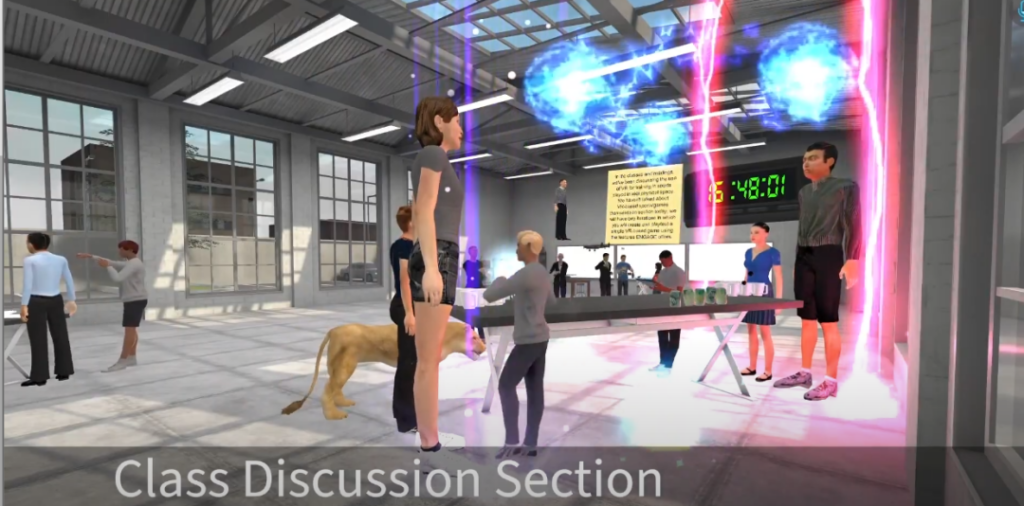Virtual reality has the potential to change EVERYTHING. For example, students could interact more with their surroundings, collaborate on projects more efficiently, and attend class without leaving home.

Join me to explore how this new way of teaching might affect traditional schools.
While we were sure of the potential VR and metaverse had, the pandemic has only sped up this technology’s progress. Even now, many companies and universities are developing virtual reality-based learning environments. Google has already made big news by offering inexpensive headsets and bringing VR to millions of Chrome browsers with their “Chrome Experiment: Cardboard.” More recently, Facebook acquired Oculus Rift for $2 billion – with the hopes of integrating the technology into many aspects of their social media platform.
The discussion in the mainstream media on conventional education has been focused on how to improve test scores. Similarly, outdated practices in virtual education may persist unless we question all aspects of current schooling, including the physical space in which it occurs.
Singapore has one of the leading education systems in the world. It has consistently scored in the top three for mathematics, science, and reading literacy on the Programme for International Student Assessment (PISA). In an interview with The Straits Times, Singapore’s Minister of Education, Mr. Heng Swee Keat, said that “The physical space in which learning takes place is not as important as what is learned and how it is learned.”
The other major thing about Singapore is teaching creativity and practical knowledge instead of exam-oriented rote learning. This is precisely what metaverse-based education would encourage.
Another way VR could change the educational landscape is by removing some of the barriers that prevent students from attending class, which are especially prevalent in low-income countries. Education can take a back seat when you work to afford food and shelter. Our society’s infrastructure makes it convenient for primary and secondary students, but college students and adults may find it impossible to attend class. Virtual reality could open up educational opportunities for those who otherwise couldn’t participate. VR would also reduce class sizes and still learn from qualified instructors.
One of the most significant advantages of virtual reality is creating an immersive experience. For example, students could be placed in a simulated environment that recreates the real world or allows them to explore other worlds. This would give them a more hands-on learning experience, which is more effective than traditional teaching methods.
Another advantage of virtual reality in education is that students can interact more with their surroundings. Traditional schools keep students in one place and require them to focus during class, but they can explore and move around freely in the metaverse. For example, if a student were studying animals, she could visit an animal’s habitat instead of just learning about it in a book. Or, imagine being able to visit ancient Greece and learn about the culture firsthand! With virtual reality, students could have access to any place in the world without ever leaving their classroom.
This type of immersive learning would also help students who struggle with traditional teaching methods. For example, a student with dyslexia might have an easier time learning in a virtual environment because it would be more immersive than a conventional classroom. Not only will this help the student learn more effectively, but he’ll be able to interact with lessons in other ways, which will help him understand the material better.
Another way virtual reality can change education is by making it easier for students to collaborate on projects. This could be especially important for online classes that allow students from all over the world to come together. For example, students could attend class virtually and work together in the same virtual room. With modern technology, they would even interact with one another in real-time. This type of collaboration could positively impact education because students could help each other learn instead of copying answers from their peers.
The problem of developing online tools or technologies that allow for scientific experiments, engineering prototyping, and other hands-on activities is still unresolved. In addition, VR technology is still in its early developmental stages, so it may be some time before the perfect solution is found.
For higher education, virtual reality holds even more potential. Traditional enrollment will decrease as universities move more of their courses online. Traditional schools will be forced to adapt and offer VR-based lectures and provide student housing. Eventually, most students may choose to learn exclusively in a virtual environment, thus avoiding the high costs of traditional education.
The fascinating story among these is of Roblox, one of the most popular virtual reality games in history and is already changing how children interact with each other. While focusing on creativity, collaboration, and social dynamics, Roblox has quickly become one of the most popular virtual reality games with 60 million active users. So it’s not hard to see how this game might impact education as it stands today.
You can imagine students learning in a virtual classroom, then going home to visit friends in the metaverse before going on a date under their favorite moon. Or perhaps planning a party in a shared virtual space! Education is just one of many industries that could be changed by VR technology. What do you think? Would you want to learn this way?
